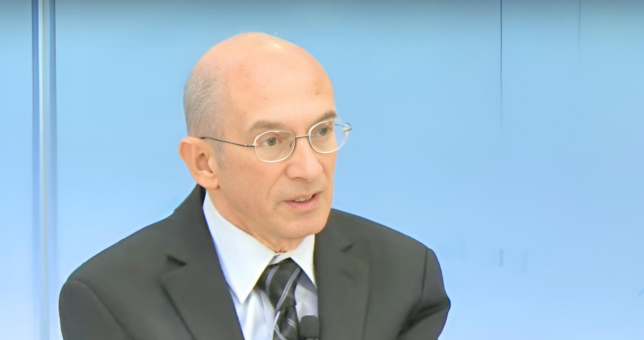Commentary
A Conversation with Economist Arnold Kling (Part 2 of 2)
The polymath and Substack writer talks to Michael E. Hartmann about libertarian and progressive views of the roles of government, for-profit business, and nonprofit charity.
 Arnold Kling at American Enterprise Institute in 2019 (YouTube)
Arnold Kling at American Enterprise Institute in 2019 (YouTube)

MIT-trained economist Arnold Kling is a cerebral polymath who brings hands-on experience in government, a calm demeanor, and clearly expressed, reasonable thought to the public discourse.
He has been an economist with both the Federal Reserve and Freddie Mac, and he’s done research for and offered commentary while at both the Mercatus Center and the Cato Institute.
His most-recent book is The Three Languages of Politics: Talking Across the Political Divides. His previous books include Specialization and Trade: A Re-introduction to Economics and Not What They Had in Mind: A History of the Policies That Produced the Financial Crisis of 2008.
Kling’s Substack page is regularly updated and reflects his wide-ranging intellect and interests, as well as his libertarian leanings. A piece on the page late last month, “The Nonprofit Brand,” caught our eye.
“Our legal system should not give any special privileges to organizations that declare themselves to be nonprofit,” he writes in the piece. Specifically, he continues, “Universities and hospitals should not be gobbling up all of the land in cities like Pittsburgh and St. Louis,” where he’s from. “For tax purposes, they should be treated as profit-seeking enterprises.”
Kling was kind enough to join me for a recorded conversation last week. In the first part, which is here, we discuss his government service, his Substack page, the role nonprofits should and actually do play in America, and generally outlines potential policy reforms related to nonprofits.
The just more than eight-minute video below is the second part—during which he talks about libertarian and progressive views of the roles of government, for-profit business, and nonprofit charity.
“You can make a libertarian argument that it would be great to expand the nonprofit sector at the expense of government, and the progressive view is we should expand government at the expense of nonprofits,” Kling tells me. “Some of what I’m arguing for is more in line with the progressive view than what you might call a libertarian view.”
Calling it what may be “my most-extreme and counterintuitive” take on the subject, Kling says he would rather get “wealthy people to invest in for-profits than to ‘give back’ to the community, because when they invest in for-profits, the success depends on pleasing customers, and when they ‘give back,’ then it’s a vanity project.”
“The profit-seeking is accountable to customers and the nonprofit is accountable to donors,” according to Kling, “and the accountability to donors works the way all the way down to the organization, so that instead of looking out to the beneficiary, they’re working up to the donor. Can I make a good PowerPoint presentation to the donor? Do I have a good annual report?”
Nonprofit employees are not asking, “Are we dealing well with the beneficiaries?” Instead, he says, they’re wondering, “Is my boss happy with what I’m doing? Can I carve out a bigger empire for myself? And can we make sure that this charity keeps going?—which may mean not solving the problem. So, all the incentives can be misaligned in the nonprofit” context. “In a profit-seeking business, there certainly are ways to be corrupt, but ultimately being accountable to customers really makes the mission a little bit more secure.”
As for a solution that looks to growing government, “If government were wise about allocating resources,” that would be one thing, Kling concludes, but if government really were wise about allocating resources, “the outcomes would be very different among different types of economies in particular.” Big, centralized “governments would have been the most effective, the most efficient,” but they have not been and there’s little reason to think they ever will be.
“That’s really the main reason for my libertarian outlook”—the “belief that wisdom is not so heavily concentrated and decentralized systems were better.”
This article first appeared in the Giving Review on June 11, 2024.



